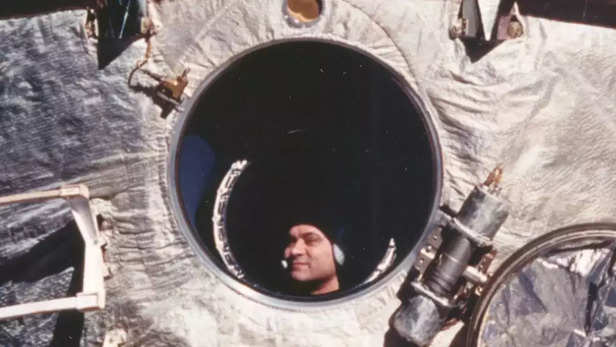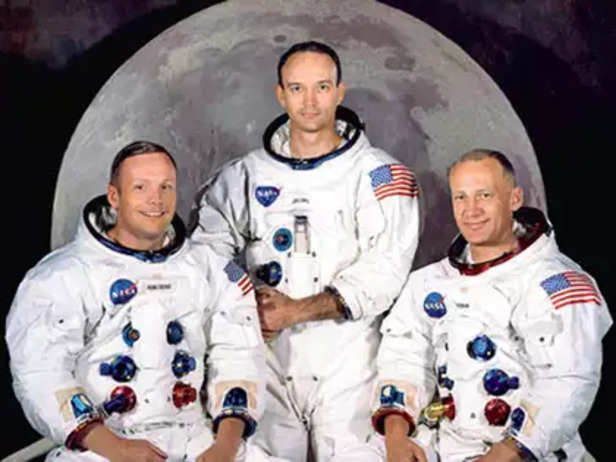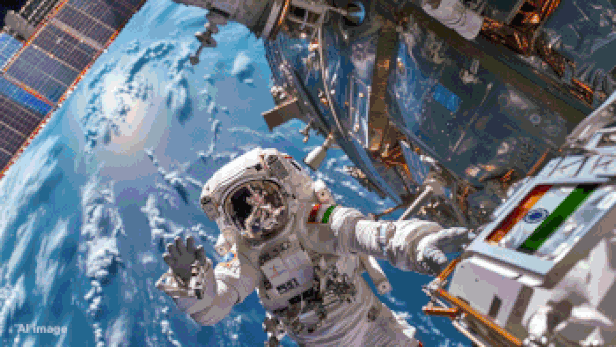How Have Astronaut World Records Pushed Human Limits?
Mili verma | Thu, 27 Mar 2025
Space travel has always been about pushing limits, testing human endurance, and doing the seemingly impossible. Over the years, astronauts have established incredible world records that have not only expanded our understanding of the universe but also redefined human potential.

Photo:
From the longest space missions to the furthest journeys, these space accomplishments and world records have paved the path for future space exploration. In this post, we'll look at some of the most incredible world records achieved by astronauts and how they've revolutionised human potential.
World Records Set by Astronauts

The Longest Continuous Stay in Space:
One of the most remarkable space records set by astronauts is the longest continuous stay in space. Valeri Polyakov, a Russian cosmonaut, holds the record for the longest single spaceflight, having spent 437 days and 18 hours aboard the Mir space station from 1994 to 1995. This record revealed the human body's ability to tolerate extended durations of microgravity, providing significant insights into the effects of long-duration space travel, which is critical for future Mars expeditions. Polyakov's mission research helped scientists create countermeasures to reduce muscle atrophy and bone loss in astronauts.
The First Man on the Moon

The historic moon landing by Neil Armstrong on July 20, 1969, is perhaps the most memorable world record in space history. As part of the Apollo 11 mission, Armstrong became the first human to step foot on another celestial body, saying, "That's one small step for man, one giant leap for mankind." This achievement was an important milestone in space exploration history, laying the groundwork for subsequent lunar missions. The data gathered during the Apollo program continues to affect modern lunar exploration and the future Artemis mission.
Space Records by Astronauts
The Longest Spacewalk:
Spacewalks, or extravehicular activities (EVAs), are essential for spacecraft maintenance and scientific study. Anatoly Solovyev holds the record for the longest spacewalk, with 16 EVAs total of 82 hours and 22 minutes outside his ship. These spacewalks assisted in the installation of new equipment and the completion of necessary repairs, demonstrating that lengthy human activity outside of spacecraft is possible, which is critical for future missions to Mars and beyond.
The Most Time Spent in Space:
Astronauts breaking world records for total time spent in space have helped scientists understand the long-term effects of microgravity. Russian cosmonaut Gennady Padalka holds the record for the most cumulative time spent in space, total of 878 days across five missions. His missions provided data on how prolonged exposure to space conditions affects the human body, informing the design of future deep-space missions.
Space Achievements and World Records
The Oldest Person in Space:
Space exploration is not just for the young. In 2021, William Shatner, famous for portraying Captain Kirk in Star Trek, became the oldest person to fly to space at age 90. His journey aboard Blue Origin’s New Shepard spacecraft symbolized the growing accessibility of space travel and how private companies are breaking new barriers in the industry. This record also demonstrated that commercial spaceflight could enable people from all walks of life to experience space.
The Youngest Person in Space:
At just 18 years old, Oliver Daemen set the record as the youngest astronaut to travel to space in 2021. His suborbital flight with Blue Origin marked a new era where space travel is no longer limited to government-trained astronauts, showing how private space tourism is becoming a reality for younger generations.
Astronauts Who Set World Records
The First All-Civilian Space Mission:
In 2021, SpaceX's Inspiration4 mission became the first all-civilian spaceflight to orbit the Earth. This milestone in space records by astronauts marked a new era in commercial spaceflight, proving that non-professional astronauts could train for and successfully complete missions beyond Earth. This mission also raised awareness and funds for medical research, demonstrating how space missions can have broader humanitarian impacts.
The Fastest Human Spacecraft:
Astronauts who set world records also include those who have traveled at record speeds. The Apollo 10 mission holds the record for the fastest human spaceflight, reaching speeds of 24,791 mph (39,897 km/h) during its return to Earth in 1969. This speed remains unmatched in manned spaceflight history and sets an important benchmark for interplanetary travel efficiency.
Space Exploration World Records

The First Woman in Space:
Breaking gender barriers, Soviet cosmonaut Valentina Tereshkova became the first woman in space in 1963. Her historic mission aboard Vostok 6 lasted almost three days, proving that women could endure the rigors of space travel just as well as men. This paved the way for future female astronauts and space exploration equality.
The First Private Citizen in Space:
The landscape of space exploration world records changed when Dennis Tito became the first space tourist in 2001. He funded his own trip to the International Space Station (ISS), opening doors for private space travel and inspiring future space tourism initiatives. This milestone demonstrated the feasibility of commercial space travel and laid the groundwork for today’s booming space tourism industry.
World Records in Space History
The Longest Mars Simulation:
Understanding how astronauts adapt to isolation is crucial for deep-space missions. The HI-SEAS experiment in Hawaii simulated a Mars mission for 366 days, setting a record for the longest Mars analog mission. This study provided insights into psychological challenges, teamwork, and resource management, helping space agencies prepare for actual Mars missions.
The Most Time Spent on the ISS:
NASA astronaut Peggy Whitson holds multiple records, including the most time spent on the International Space Station (665 days) and being the oldest woman in space at age 57. Her contributions to space research have advanced knowledge on human spaceflight, particularly regarding age, radiation exposure, and long-duration mission effects.
Astronauts Breaking World Records

The Most Consecutive Days in Space by a Woman:
Christina Koch set the record for the longest single spaceflight by a woman, spending 328 consecutive days in space from 2019 to 2020. Her mission provided critical data on the effects of long-duration space travel, paving the way for future lunar and Mars missions by proving women’s resilience in extended spaceflights.
The First All-Female Spacewalk:
In 2019, Christina Koch and Jessica Meir completed the first all-female spacewalk, marking a historic milestone. This event represented increased gender equality in space exploration and was a significant step toward encouraging diversity in STEM fields and inspiring future generations of women to seek professions in space science.
The Future of Astronaut World Records
As space organisations and commercial companies continue to push the envelope, new world records in space history are being established. Future milestones could include the first human mission to Mars, the longest space colonization initiatives, and unprecedented advances in space travel speed and technology. Artificial gravity homes, sophisticated propulsion technologies, and deep-space exploration missions will help to expand human presence in space, setting new records for future generations.
Astronauts breaking world records have redefined what humanity is capable of, from landing on the Moon to spending years in space. These space milestones and world records influence the future of space exploration. As technology progresses, the next generation of astronauts will likely push these boundaries even further, motivating humanity to strive for the stars.
Unlock insightful tips and inspiration on personal growth, productivity, and well-being. Stay motivated and updated with the latest at My Life XP.
FAQs (Frequently Asked Questions) :
World Records Set by Astronauts

Valeri Polyakov
The Longest Continuous Stay in Space:
One of the most remarkable space records set by astronauts is the longest continuous stay in space. Valeri Polyakov, a Russian cosmonaut, holds the record for the longest single spaceflight, having spent 437 days and 18 hours aboard the Mir space station from 1994 to 1995. This record revealed the human body's ability to tolerate extended durations of microgravity, providing significant insights into the effects of long-duration space travel, which is critical for future Mars expeditions. Polyakov's mission research helped scientists create countermeasures to reduce muscle atrophy and bone loss in astronauts.
The First Man on the Moon

Neil Armstrong
The historic moon landing by Neil Armstrong on July 20, 1969, is perhaps the most memorable world record in space history. As part of the Apollo 11 mission, Armstrong became the first human to step foot on another celestial body, saying, "That's one small step for man, one giant leap for mankind." This achievement was an important milestone in space exploration history, laying the groundwork for subsequent lunar missions. The data gathered during the Apollo program continues to affect modern lunar exploration and the future Artemis mission.
Space Records by Astronauts
The Longest Spacewalk:
Spacewalks, or extravehicular activities (EVAs), are essential for spacecraft maintenance and scientific study. Anatoly Solovyev holds the record for the longest spacewalk, with 16 EVAs total of 82 hours and 22 minutes outside his ship. These spacewalks assisted in the installation of new equipment and the completion of necessary repairs, demonstrating that lengthy human activity outside of spacecraft is possible, which is critical for future missions to Mars and beyond.
The Most Time Spent in Space:
Astronauts breaking world records for total time spent in space have helped scientists understand the long-term effects of microgravity. Russian cosmonaut Gennady Padalka holds the record for the most cumulative time spent in space, total of 878 days across five missions. His missions provided data on how prolonged exposure to space conditions affects the human body, informing the design of future deep-space missions.
Space Achievements and World Records
The Oldest Person in Space:
Space exploration is not just for the young. In 2021, William Shatner, famous for portraying Captain Kirk in Star Trek, became the oldest person to fly to space at age 90. His journey aboard Blue Origin’s New Shepard spacecraft symbolized the growing accessibility of space travel and how private companies are breaking new barriers in the industry. This record also demonstrated that commercial spaceflight could enable people from all walks of life to experience space.
The Youngest Person in Space:
At just 18 years old, Oliver Daemen set the record as the youngest astronaut to travel to space in 2021. His suborbital flight with Blue Origin marked a new era where space travel is no longer limited to government-trained astronauts, showing how private space tourism is becoming a reality for younger generations.
Astronauts Who Set World Records
The First All-Civilian Space Mission:
In 2021, SpaceX's Inspiration4 mission became the first all-civilian spaceflight to orbit the Earth. This milestone in space records by astronauts marked a new era in commercial spaceflight, proving that non-professional astronauts could train for and successfully complete missions beyond Earth. This mission also raised awareness and funds for medical research, demonstrating how space missions can have broader humanitarian impacts.
The Fastest Human Spacecraft:
Astronauts who set world records also include those who have traveled at record speeds. The Apollo 10 mission holds the record for the fastest human spaceflight, reaching speeds of 24,791 mph (39,897 km/h) during its return to Earth in 1969. This speed remains unmatched in manned spaceflight history and sets an important benchmark for interplanetary travel efficiency.
Space Exploration World Records

The incredible view
The First Woman in Space:
Breaking gender barriers, Soviet cosmonaut Valentina Tereshkova became the first woman in space in 1963. Her historic mission aboard Vostok 6 lasted almost three days, proving that women could endure the rigors of space travel just as well as men. This paved the way for future female astronauts and space exploration equality.
The First Private Citizen in Space:
The landscape of space exploration world records changed when Dennis Tito became the first space tourist in 2001. He funded his own trip to the International Space Station (ISS), opening doors for private space travel and inspiring future space tourism initiatives. This milestone demonstrated the feasibility of commercial space travel and laid the groundwork for today’s booming space tourism industry.
World Records in Space History
The Longest Mars Simulation:
Understanding how astronauts adapt to isolation is crucial for deep-space missions. The HI-SEAS experiment in Hawaii simulated a Mars mission for 366 days, setting a record for the longest Mars analog mission. This study provided insights into psychological challenges, teamwork, and resource management, helping space agencies prepare for actual Mars missions.
The Most Time Spent on the ISS:
NASA astronaut Peggy Whitson holds multiple records, including the most time spent on the International Space Station (665 days) and being the oldest woman in space at age 57. Her contributions to space research have advanced knowledge on human spaceflight, particularly regarding age, radiation exposure, and long-duration mission effects.
Astronauts Breaking World Records

Breaking World Records
The Most Consecutive Days in Space by a Woman:
Christina Koch set the record for the longest single spaceflight by a woman, spending 328 consecutive days in space from 2019 to 2020. Her mission provided critical data on the effects of long-duration space travel, paving the way for future lunar and Mars missions by proving women’s resilience in extended spaceflights.
The First All-Female Spacewalk:
In 2019, Christina Koch and Jessica Meir completed the first all-female spacewalk, marking a historic milestone. This event represented increased gender equality in space exploration and was a significant step toward encouraging diversity in STEM fields and inspiring future generations of women to seek professions in space science.
The Future of Astronaut World Records
As space organisations and commercial companies continue to push the envelope, new world records in space history are being established. Future milestones could include the first human mission to Mars, the longest space colonization initiatives, and unprecedented advances in space travel speed and technology. Artificial gravity homes, sophisticated propulsion technologies, and deep-space exploration missions will help to expand human presence in space, setting new records for future generations.
Astronauts breaking world records have redefined what humanity is capable of, from landing on the Moon to spending years in space. These space milestones and world records influence the future of space exploration. As technology progresses, the next generation of astronauts will likely push these boundaries even further, motivating humanity to strive for the stars.
Unlock insightful tips and inspiration on personal growth, productivity, and well-being. Stay motivated and updated with the latest at My Life XP.
FAQs (Frequently Asked Questions) :
- What is the world record for astronauts?
The longest cumulative time spent in space is 878 days, held by Russian cosmonaut Gennady Padalka. - What do 9 months in space do to your body?
Spending 9 months in space leads to muscle atrophy, bone density loss, vision problems, immune system changes, and fluid redistribution due to microgravity. - Who has spent 665 days in space?
NASA astronaut Peggy Whitson has spent 665 days in space, holding the record for the most time spent by an American astronaut. - Who is the No. 1 astronaut in the world?
Neil Armstrong is often regarded as the most famous astronaut for being the first human to walk on the Moon in 1969. - What is the Golden Record in space?
The Golden Record is a phonograph record sent aboard Voyager 1 and 2, containing sounds and images representing Earth's culture, intended for extraterrestrial life.










